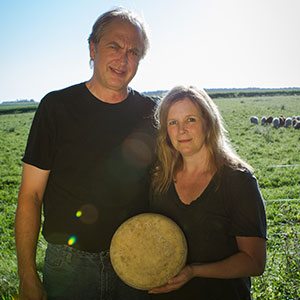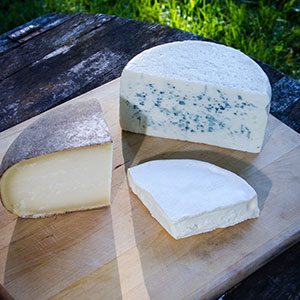Shepherd’s Way Farm, a farmstead sheep dairy and creamery, conjures images of the ancient pastoral seasonal rhythm that has guided our collective agrarian history. Flocks of animals are grazing, moving from pasture to pasture, gathering sustenance and producing milk that would nourish the community in coming seasons.

In the digital extravaganza that has become the modern rhythm — the always on, always connected to a vast current of data flying at warp speed — most of us are profoundly disconnected from these seasonal ebbs and flows that seem to happen imperceptibly, while we are distracted. Days and weeks pass, and suddenly a month has gone by.
Though the rhythms of farm life happen on a seemingly different sort of time, they are susceptible to the vagaries of life and the inevitable complications. This is magnified by adding livestock, life in a 100-year-old farmhouse and the running of a small, growing business that demands precision and intensive capital investment.
My visit to this bucolic farm about an hour south of Minneapolis was just after a large farm tour, a family gathering and a knee injury for the cheesemaking assistant, who also is the owners’ third son. Adding to the challenges, a kink in the stove gas line renders the oven unusable and continuing cleanup from a recent storm that brought a tree crashing into the laundry room roof.

Amid this frenetic energy, cheesemaker and owner Jodi Ohlsen Read works with her mantra: “It’s okay, no big deal.” Her kind eyes twinkle with hard-earned wisdom and determination, forged through years of farm life, mothering four boys and navigating nightly soccer practices and a day job as a writer in the early years, all sandwiched between handcrafting vats of award-winning cheese.
To speak with Jodi Read is a realization of how really not busy one’s own “really busy” is.
It is clear that she and her husband Steven Read – college sweethearts who married young —still clearly enjoy each other and the life they have created. They met at the University of Minnesota, where she studied journalism and he studied political science and did graduate work in agricultural education.
“In graduate school, Steven came across the idea of raising sheep, and it stuck with him,” she says. “You hear something and then it keeps coming back to you and back to you.”
In 1994, just as Steven was finishing up his Masters and Jodi was pregnant with their second child, the couple bought 50 dairy sheep. Their early flock was part of the Wisconsin Sheep Dairy Cooperative, which pooled milk and sold it to various clients.
At the time, their move toward cheese-making was met with incredulousness. “‘You can milk a sheep?’ people would ask,” she recalls with a bit of a grin. “The awareness now is so different, but people were genuinely perplexed when we started — including our families.”
Sheep milk is unique in that you can freeze it and there is no separation when it’s thawed, removing many of the challenges of fluid milk transport. As demand increased, the couple grew their flock size, eventually becoming one of the largest dairy sheep flocks in the United States.

Business Interrupted
The business model abruptly shifted when one of the main clients stopped purchasing the milk, leaving a surplus with no buyer. “If you can’t sell your milk, you better make something with it,” recalls Jodi Read. “This pushed us to give cheesemaking a shot.”
While sheep cheese has deep roots in Europe, particularly in the Basque region between France and Spain and throughout the Mediterranean countries, it was slow to catch on in the States.
When the Reads began making sheep cheese in 1998, they were among the first American producers embracing this new milk type, alongside New York State’s Old Chatham Sheepherding Company, Vermont Shepherd, as well as Cypress Grove Chevre and Bellwether Farms in California, which began operations in the 1980s and early ’90s.
Dairy sheep produce far less milk over a shorter season than other dairy animals. While the milk is high in components such as fats and proteins and excellent for cheesemaking, at the time, few people in the United States knew how to successfully make sheep cheese.
As luck would have it, people at the University of Minnesota Food Processing Pilot Plant in St. Paul had experience working with sheep milk. After the couple talked with local cheese retailers and did a bit of market research, university experts helped them develop and refine their cheese-making recipes.

The first batches of Shepherd’s Way Farms’ Friesago — a nod to its flock of Friesian cross-bred sheep and inspired by European Manchego and Asiago — were made in St. Paul under the direction of Ray Miller, a scientist and coordinator of the plant.
When it came time to taste the initial batch, this early research paid off. The Reads had the first tasting alongside the researchers and retailers who offered recipe development and guidance.
Right out of the gate, the reception was positive and Friesago went for sale at Surdyk’s Cheese Shop in Minneapolis. The year was 1998. “We were really able to do what we did because we worked with people who were willing to share their knowledge,” says Jodi Read.
The Reads’ second cheese, Shepherd’s Hope, a fresh sheep milk cheese, came along the next year. In 2001, as their operation continued to grow, the couple moved to a larger property in Nerstrand, MN, and began retrofitting to accommodate their smaller statured flock. Over the next few years, theirs would grow to be one of the largest dairy sheep flocks in the country.
Adjacent to the farm is the aptly named Big Woods, a haven of tall trees that stands out amid endless rows of corn. This local landscape provided inspiration for the name of their acclaimed blue cheese, Big Woods Blue, introduced in 2004.
Getting Noticed
That same year, Friesago won an award at the American Cheese Society conference, putting Shepherd’s Way on the map.
In 2003 and 2004, while her four sons were young, Jodi Read continued her work as a writer and editor for medical science publications while Steven worked the farm. “I would make cheese all day and then write,” she recalls.
Two days before Christmas, when she had a story due and all the frenzy of the cheese business and holiday preparations, she realized she could not cover two jobs. Steven’s advice: quit one.
“I think I was the most surprised of anyone because I’d worked so hard and writing was my passion. To then turn to cheese, it was strange. It makes me crazy a lot of the time, but it is deeply satisfying and challenging. I couldn’t not do it.” says Jodi Read.
The couple’s unique vocation has also afforded them the opportunity to work together as a family with the larger goal of farming the land. In 2004, the duo was invited to participate in the first-ever Slow Food Terra Madre, a world gathering of small food producers and farmers in Italy.
“We didn’t know what it was because it had never happened before,” she says. “Just to be in the presence of 5,000 small food producers from all over the world made us realize that we are not the only people doing this. To be brought into a community like that was amazing. They said we are food revolutionaries. It was a life affirming experience.
“It was good that that happened; it helped ground us when disaster struck,” continues Jodi Read. “We got fortified right before the big blow.”
Just months after their return from Italy, in January, 2005, a fire destroyed the lambing barn, killing more than 400 sheep and, of those that survived, many had long term consequences that weren’t apparent immediately. The devastating blaze was later determined to be arson and had far reaching repercussions for their business.
“People wonder, why has it taken so long? You just think you’d get a check, you’d rebuild. But there were so many consequences of the fire that played out. The sheep that lived didn’t do well. You can’t just go out and buy a flock. You develop the quality of the flock over time,” says Jodi Read.
With lots of delays in reconstruction and financing and the 2008 recession, the family just kept moving forward one step at a time, raising capital through Slow Money, receiving a USDA producer grant and launching a Kickstarter campaign to rebuild the lamb barn.
“We learned a lot and are more efficient,” she says of the rebuilding process. “Our family really pulled together. We are now producing about half the amount we were pre-fire. But we are still here. That’s a big deal. Our goal was always to raise our family this way, and that we did.”
Being sustainable — financially, personally, environmentally — is a tough bar to reach, even tougher to maintain, says Jodi Read.
“When you are small, every single little thing could tip you over,” she says. “Sustainability long term on all levels – environmental, personal, financial and whether we’ll be able to pass this on to our children. Those things keep me up at night.”
Yet this doesn’t stop Jodi Read from giving back. She serves as president of the fledgling Minnesota Cheese Guild, which holds a festival each spring. She and Steven recently wrapped up a yearlong leadership training serving as Minnesota Farmers Union Enterprises Leadership Couple in 2015. This commitment brought them together with couples from four other Midwest states to learn and share about ag issues, culminating with a “fly in” to Washington, D.C. There, they met with legislators on Capitol Hill to present family farm issues.
Today, things are on a good trajectory. They’ve added some new cheeses to their line-up including a mixed-milk bloomy rind called Hidden Springs. The creamery is poised to add more production as its flock expands and planned upgrades are completed in the cheese room.
Three of the four Read sons participate on the farm, either making cheese, working on the farm side or doing marketing. The operation is moving along and reserves of cheese are aging in the cave, ready for a hungry market.
The family behind Shepherd’s Way proves that resiliency is an important characteristic in carrying forth the time-honored tradition of sheep dairying in the Midwest.



